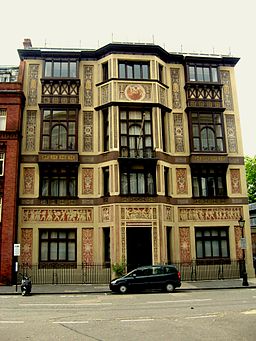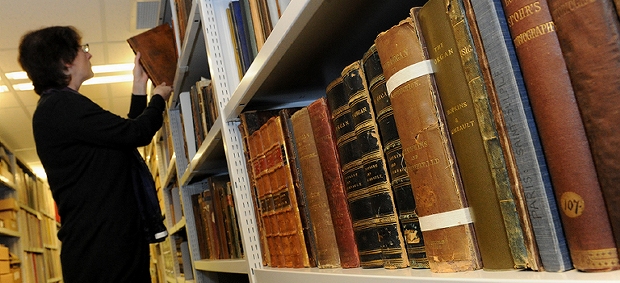
You’ve heard the corny old joke about organists, I imagine? What’s the difference between an organist and a terrorist? You can’t reason with an organist. (Music librarians may not fully understand the joke, organists will protest, but there are clergy who will smile wrily. I’m an organist, or I wouldn’t dare say it!)
Andrew McCrea, reminding us that the RCO had its 150th anniversary in 2014, alluded to recent researches into the organisation’s history, and the varied employment conditions, aspirations, and other occupations held by Victorian organists. (Portfolio careers are nothing new.) However, the RCO initially came about thanks to the determination of a small group of London organists, who wanted their occupation to be regarded as a respectable profession with chartered status. To achieve this, they acquired accommodation which offered lectures, a library, prizes and certificates, and club facilities.
Before long, the records document donations and bequests to the library from members, but it appears that sheet music was neither purchased nor catalogued, even into a handlist, well into the twentieth century. The collection thus reflected the interests of individual donors, and the donations themselves often lay for years unsorted before anything was done with them. Until the 1960s, it was quite an eclectic collection, with fewer organ scores than one might imagine; however, non-organ-related materials were at that point auctioned off at Sotheby’s. The remaining collection contains some unexpected treasures, such as the very beautiful John Norbury drawings and watercolours of organs, and the Southgate manuscript of 18th century organ music, revealing the musical tastes of one contemporary English organist. Sacred choral music is another strength, with music coming from the personal collection of John Bumpus, one-time librarian at St Michael’s College, Tenbury.
By the late 1980s, the library was put on a sounder footing with a part-time librarian and then also an assistant librarian. Postal borrowing was introduced – a facility much appreciated by diploma students – and in the 1990s, a British Library grant facilitated the cataloguing of the stock. In the early years of the present century, the RCO considered moving to new premises in Birmingham in what was called the Curzon Street project, and with that in mind the library was moved to the University of Central England. By 2006, the catalogue was online through collaboration with the University of Central England (now City University), but the planned move of the parent institution didn’t actually happen.

Copyright Royal College of Organists.
Not so long ago, there were negotiations with the British Institute of Organ Studies, whose British Organ Archive is also housed in Birmingham, but a projected merging of collections came to nothing at that time. Nonetheless, the presence of two significant collections in one city does mean that Birmingham is very well-endowed with organ music. IAML member Frances Pond of City University looks after the RCO collection on a part-time basis, and it continues to attract major acquisitions such as the Organ Club Collection in 2005; the Peter Williams Collection (purchased in 2008); the David Sanger Collection, bequeathed in 2010; and the Susie Jeans Archive from Reading University – in all, 1800 linear feet, which include organ music and books, periodicals, archival material, audio-visual items, paintings and miscellaneous artefacts.
You could say that there is much to be said for the determined nature of organists!
Along with the links included above you might also like to see: Library of Birmingham Rewriting the Book: A Brief History of Curzon Street Station (unrelated to the RCO but included as recognition of the Library of Birmingham’s achievements).
Dr. Karen McAulay, Royal Conservatoire of Scotland
Here is the page for exploring the online catalogue of the Royal College of Organists:- https://www.rco.org.uk/library_catalogue.php (sorry, I ought to have shared that!
Reblogged this on Karen McAulay Teaching Artist and commented:
In which I recall one of the highlights of the IAML UK & Ireland Annual Study Weekend 2015…